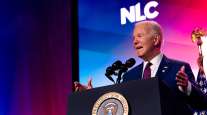Senior Reporter
House Panel to Hear From Secretary Chao on Infrastructure March 6

Less than a week after meeting with senators, the country’s top transportation officer will explain President Donald Trump’s infrastructure proposal to a House policy committee.
Secretary Elaine Chao is scheduled to appear before the Transportation and Infrastructure panel March 6, where authorizers are likely to pepper her with questions about recent assertions that Trump endorsed raising the federal fuel tax.
While Republican policymakers are largely opposed to increasing the taxes on gas and diesel, committee Chairman Bill Shuster (R-Pa.) did not rule out a higher fuel tax when he addressed the American Association of State Highway and Transportation Officials in Washington on Feb. 28.
“It’s something that I think is out there, the president is talking about it, and that’s important to do,” Shuster said.
Chao did not comment on whether Trump had backed the increase when she was pressed about it during a hearing of the Senate Environment and Public Works Committee. The secretary told Sen. Chris Van Hollen (D-Md.) she would not discuss conversations she had with the president privately.
Van Hollen’s colleague, Sen. Tom Carper (D-Del.), was the first to claim Trump supported a fuel-tax increase when the president met with policymakers at the White House on Feb. 14.
“To my surprise, President Trump, today in our meeting, offered his support for raising the gas and diesel tax by 25 cents a gallon and dedicating that money to improve our roads, highways and bridges. I explained to the president what I have proposed for years now, raising the gas and diesel tax four cents per year over four years and indexing it going forward,” Carper said in a statement obtained by Transport Topics.
The White House has not denied Trump’s comments.
The federal fuel tax, meanwhile, has not been raised since 1993. Stakeholders insist raising the tax would alleviate funding concerns with the federal Highway Trust Fund, an account backed primarily by revenue from the excise tax on gas and diesel fuel. It is used to help states pay for projects.




